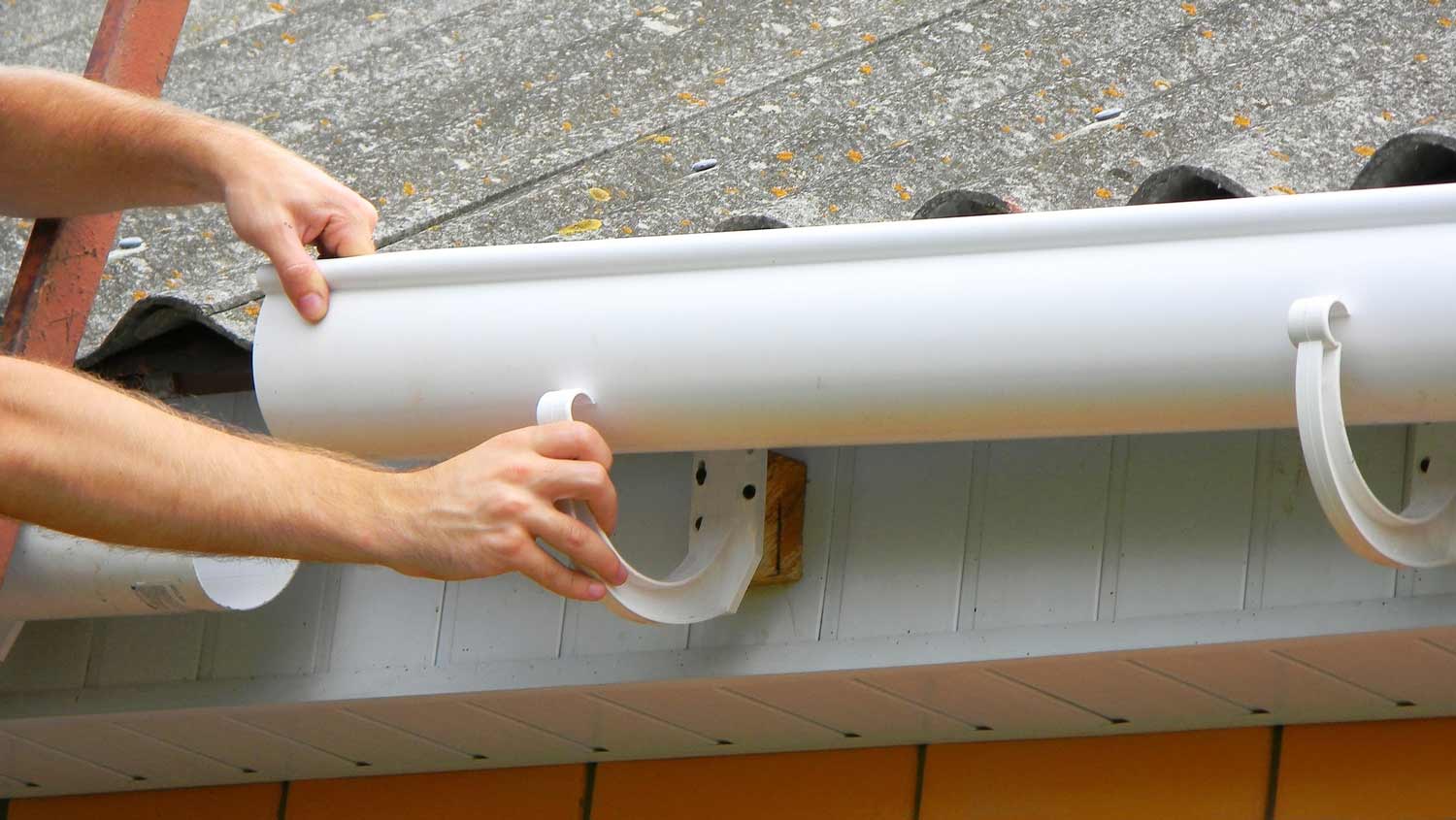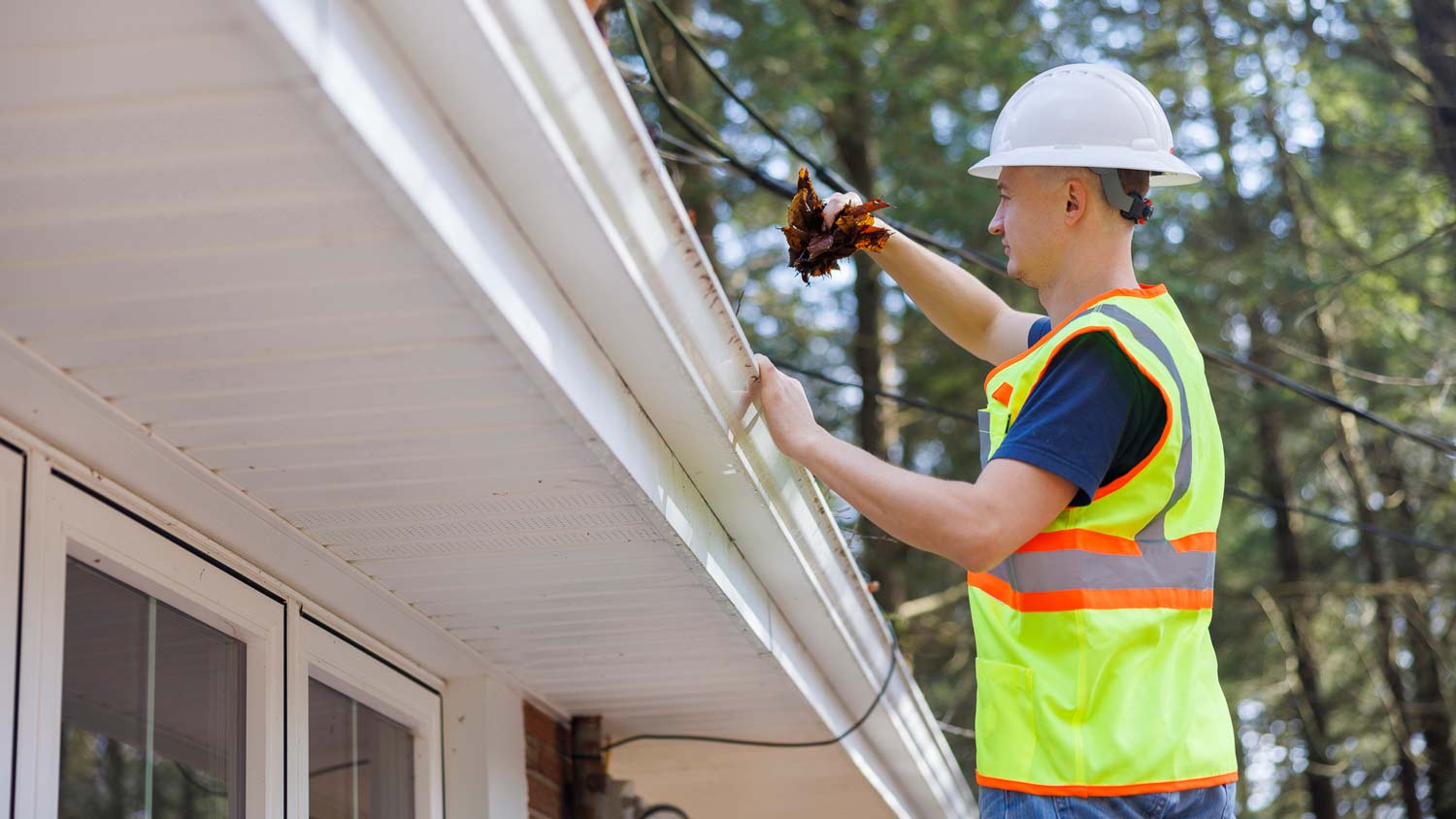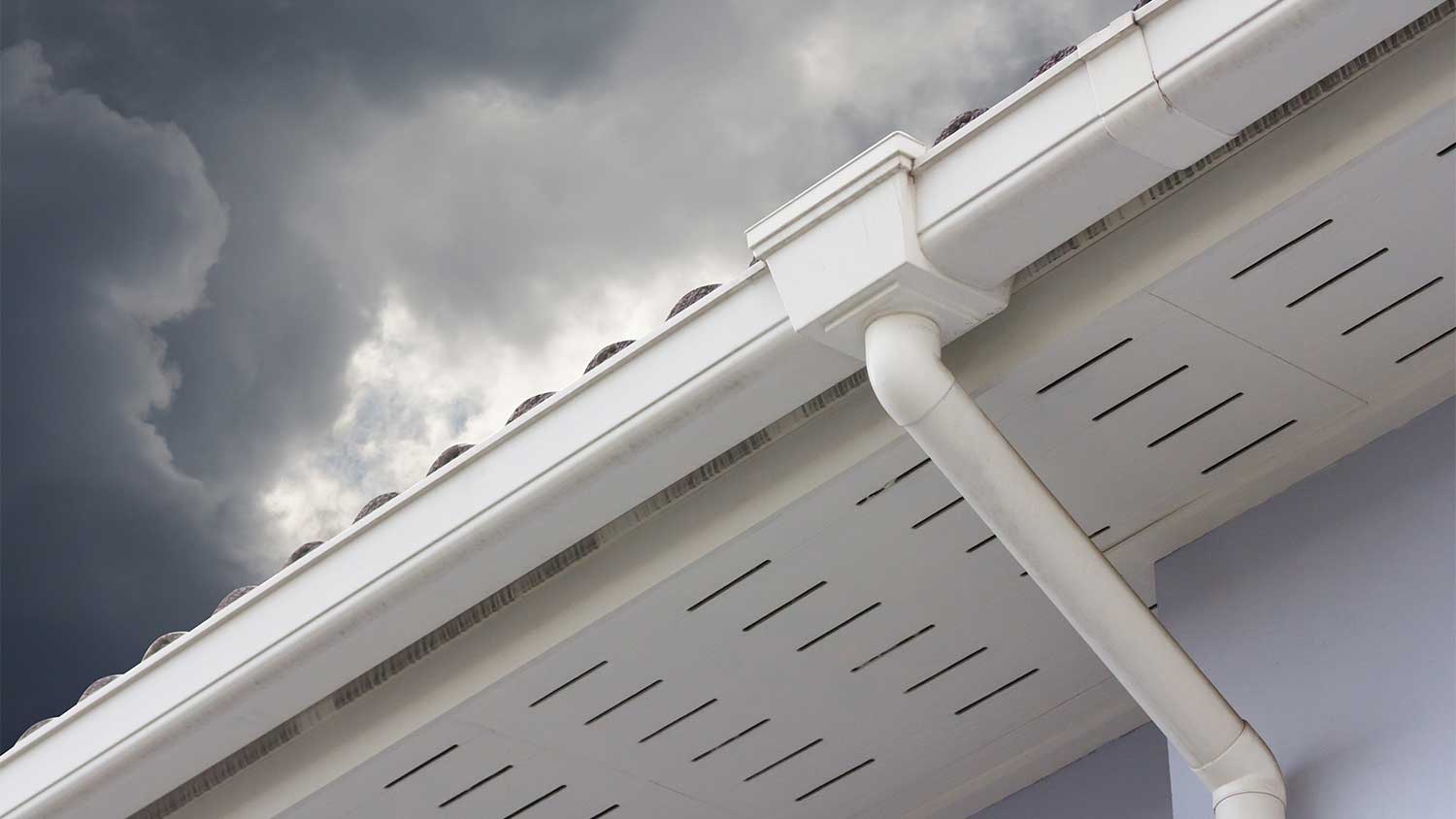How Much Does Vinyl Gutter Installation Cost? [2025 Data]
The average vinyl gutter installation costs $1,100, but it can range between $800 and $1,300 depending on the linear feet installed, the condition of your roof, and gutter style.


Vinyl gutter installation costs are based on linear feet, with most homes requiring an average of 150 linear feet. While costs vary a bit, homeowners can expect to spend between $5 and $10 per linear foot of installed vinyl gutters. This averages out to about $1,100 for a typical installation, though it can run as low as $500 and as high as $3,200 depending on your gutter style, home size, and other factors.
Vinyl Gutter Installation Cost Factors

Types
There are three common gutter types. The most popular and affordable is the K-style gutter. The other two styles are half-round and box-style.
Half-round gutters are typically found on older homes and aren’t often made of vinyl. Box-style gutters are wide and designed to handle extreme amounts of precipitation, which is why they’re often seen on commercial structures. Note the prices below are for vinyl gutters only, and other materials (like copper) can be five to ten times the price.
| Vinyl Gutter Type | Average Cost |
|---|---|
| K-style | $800-$1,300 |
| Half-round | $1,000–$1,800 |
| Box-style | $900–$1,600 |
Size
Most homes will have an average roofline of around 150 linear feet. Materials and labor take up a relatively even split of the costs but the larger the project, the more you’ll spend. We’ve included some lower ranges below as well, just to give an idea of what it would cost to only replace a single section of gutters versus the entire system.
| Linear Feet | Average Cost |
|---|---|
| 20 | $200–$400 |
| 40 | $250–$550 |
| 75 | $400–$600 |
| 90 | $550–$900 |
| 110 | $700–$1,000 |
| 150 | $850–$1,300 |
| 200 | $1,100–$1,600 |
| 300 | $1,400–$2,400 |
Materials
Material costs for installing or replacing vinyl gutters consist of a few separate parts, the most expensive being the gutters themselves. However, it’s important to understand what makes up the total price, even if you don’t have too much leeway when swapping out different items and brands.
Other than the gutters, you’ll be paying for:
Downspouts
Gutter hanger
Gutter end cap
Roof fascia (if in bad condition)
Labor
Vinyl gutter installation will cost homeowners between $50 and $100 per hour in labor fees. While this may seem pricey, remember that cost includes the pro’s insurance, expertise, and equipment required for the project. For an experienced pro, expect to pay on the upper end of that price range.
Prep
If you have existing gutters, they’ll need to be removed. This involves removing the hangers and separating the gutters from the roof fascia—a great time to check your roof for rot or other damage. Talk to a pro about required prep work if you’re not clear on the state of your existing gutters or simply don’t want to work up high. Labor fees for prep work will cost around the same as installation.
Vinyl Gutter Ongoing Costs

There aren’t many ongoing costs associated with vinyl gutters. Since there are no moving parts, there’s nothing to grease or tune. If you notice any sagging of gutters or bad sloping, check the mounting brackets and roof condition. Other than that, maintenance comes down to keeping an eye out for problems and biannual cleanings.
Maintenance
Gutter maintenance is pretty straightforward. For most homeowners, this will only involve cleaning gutters out a few times a year and possibly readjusting the gutter’s slope angle and brackets. You can DIY this with a ladder and a power washer, but for most homeowners who have more than a single-story home, we recommend hiring a pro. It eliminates any safety risk you’d take on.
Repairs
Vinyl gutter repairs will cost the same hourly rate as installation ($50 to $100 per hour). Depending on the type of repair, it may be worth considering replacing either that gutter section or every gutter around the house. The reason for this is that vinyl gutters have a relatively short lifespan of 10 to 15 years, and if you already have the pro fixing a part of them, you may want to knock out the entire project at once. It may have a higher initial cost, but it’s less expensive over time.
DIY Vinyl Gutter Installation vs. Hiring a Pro
You can DIY some of the maintenance, but when it comes to installation, you should leave this to a pro. There are a few reasons why hiring a local gutter installation expert makes sense: ensuring proper work, ensuring the warranty isn’t voided by DIY work, and finally (and possibly most importantly), pros are familiar with working at heights and will be much less accident-prone than regular homeowners.
There are plenty of DIY projects to take on if you’re looking to keep your fixing skills sharp, but this isn’t one of them.
Tips to Reduce Cost While Installing Vinyl Gutters
The cost of gutter installation can put a strain on your household budget. Homeowners should always be on the lookout for savings, even if they aren’t so easy to attain. Some ways to save money on an installation are:
Buy all materials in bulk when possible.
Try to repurpose materials like mounting brackets or paint.
Avoid extra features.
Schedule work for your pro’s off-season.
Reuse existing downspouts if they are in good condition.
For larger projects, it’s best to gather multiple quotes and choose the one that feels right. Once you choose your contractor, try negotiating with your pro for an even better rate.
How Angi Gets Its Cost Data
Home is the most important place on earth, which is why Angi has helped more than 150 million homeowners transform their houses into homes they adore. To help homeowners with their next project, Angi provides readers with the most accurate cost data and upholds strict editorial standards. We extensively research project costs to develop the pricing data you see, so you can make the best decisions for you and your home. We rely on reputable sources, including the U.S. Bureau of Labor Statistics, academic journals, market studies, and interviews with industry experts—all to ensure our prices reflect real-world projects.
Want to help us improve our cost data? Send us a recent project quote to costquotes@angi.com. Quotes and personal information will not be shared publicly.
Frequently Asked Questions
Vinyl gutters cost less to install than other types like copper or aluminum gutters. This is because the manufacturing of vinyl is so cost-efficient that it’s often the least expensive option for any project, not just gutters. However, remember that vinyl doesn’t last as long as other materials like wood and metal, so it’s worth considering if vinyl gutters are less expensive over a 30-year time horizon, and not just at the time of purchase.
On average, gutters last between 15 and 25 years. Certain materials (stainless and galvanized steel, copper, and cast iron) will have much longer lifespans, with much higher price tags. Vinyl typically lasts only 10 to 15 years, while the second most commonly used material, aluminum, lasts an average of 25 years. Only you as the homeowner will know if the additional cost of upgraded materials makes sense for your home.
The main disadvantage of vinyl gutters is that vinyl simply isn’t as strong as other materials. Over time, vinyl degrades due to its lightweight and inability to withstand larger forces like ice buildup, tree limb damage, or even excess water during periods of heavy precipitation. If you live in an area with frequent weather events (or even just snow or large leaf buildups in autumn) you may want to consider a tougher material like aluminum or steel.
Vinyl gutters are the least expensive gutter material, but that doesn’t mean they have to be simple. Gutter guards can be installed at the same time as the gutters themselves and help block unwanted debris. For more aesthetic additions, you can paint the gutters to match either your roof color or the color of your siding. Finally, consider shopping around for more sustainable options during installation, such as recycled downspouts.















